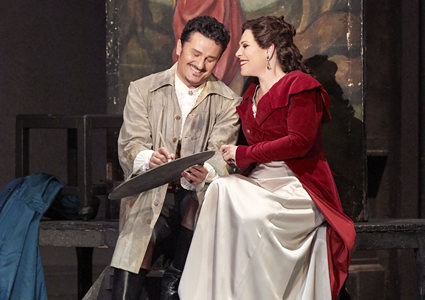| Opera Reviews | 27 April 2024 |
Piotr Beczala illuminates this Tosca revivalby Moore Parker |
|
| Puccini: Tosca
Vienna State Opera 7 February 2019 |
|

Piotr Beczala (Cavaradossi), Sondra Radvanovsky (Tosca)
|
|
|
The buzz surrounding this 606th performance of Margarethe Wallmann's production of Tosca was unquestionably Piotr Beczala’s first stage Cavaradossi - and as such, an event usurping not just the title role on this occasion, but thereby a celebrated soprano undertaking the part for the first time in this house. Beczala was deserving of the focus, shining as an artist of truly fine calibre, singing with lyricism that provided sufficient tone for any declamatory outbursts, and fully looking the part of the young amorous beau. In the odd moment his phrasing appeared a touch short-breathed on this occasion - but conceivably the role will further settle with future showings. His "E lucevan le stelle" was met with an anticipated furor - intercepted and further propelled by a single boo while agitating hopes of a possible encore, which was not, however, to be. "O dolci mani" was spun with a grace and finesse to rank with any tenor in living memory, and Cavaradossi’s final duo with Tosca - in its optimistic flourish of emotion - stamped the seal on a significant addition to the Polish star’s stable of roles. Thomas Hampson may not be vocally predestined for Scarpia but his reading is unquestionable proof of an intelligent approach and astute acting ability winning the day. Impressively paced, and full of compelling nuance (his covert chuckle as Tosca rants at Cavaradossi’s portrait, or the sensual unbuttoning of his waistcoat in Act 2, being just two examples) - and therefore scoring with a writer who has seen interpreters ranging from Gobbi (in the legendary London production) through to Taddei, Raimondi, Terfel, et al.). Hampson brought suave elegance and intensity to his entrance, followed by a well-negotiated Te Deum - while, alas, lacking the ideal big guns to send the curtain down with true aplomb. Act II was rather too comfy in its intimate soliloquy (with echos of Schubert or Wolf here and there), and with the voice later lacking the necessary bite for some of the vital phrases. Evidently of sturdy constitution, however, it took four lunges of Tosca’s blade before this Scarpia’s demise, with the perpetrator oddly almost lying directly upon the bleeding corpse for "E avanti a lui tremava tutta Roma." Among so many Vienna Toscas, this was arguably the least chilling Act II finale on record. Sondra Radvanovsky was presenting her internationally-established Tosca to Vienna for the first time. Her lyric spinto instrument is unquestionably adequate in tone (while no more generous than recent revivalists such as Martina Serafin) but - perhaps due to the given circumstances - was superimposed upon a character overloaded with histrionic gestures, resulting in an implausible and unsympathetic matron who appeared much out of sync with the candid portrayals at her side. A secure - if steely - range above the stave impressed, but paled in significance alongside odd notation liberties, heavily covered vowels, and a sense of ill-adjustment to Vienna’s high-set pitch of 443Hz. However, numerous passages throughout the evening hinted strongly at the potential that certain Strauss and Wagner repertoire could offer, as this artist moves forward in her career. Ayk Martirossian’s jailer was proof that there are no small roles in the world of theatre, surreptitiously accepting the prisoner’s bribe and attending to his pre-execution duties with discrete conviction. Benedikt Kobel gave a self-assured (rather than cowering) Spoletta, to compliment Igor Onishchenko’s youthful Sciarrone. Less convincing (in fact, rather “ham”), Ryan Speedo Green’s nutty-toned Angelotti rather disappointed - alongside Alexandru Moisiuc’s po-faced Sacristan, who failed to register and deliver the only potentially humorous moments in the work. Conductor, Marco Armiliato managed a slightly unruly revival (spiked with occasional hitches and moments of amnesia on stage) with admirable control, culminating in a particularly atmospheric foundation in the final act for Cavaradossi’s farewell aria and the evening’s ultimate highlight. June of this year sees a further revival with Beczala, but with Nina Stemme in the title role and Carlos Álvarez singing his first Baron Scarpia in the house.
|
|
| Text ©
Moore Parker Photo © Wiener Staatsoper / Michael Pöhn |
|







